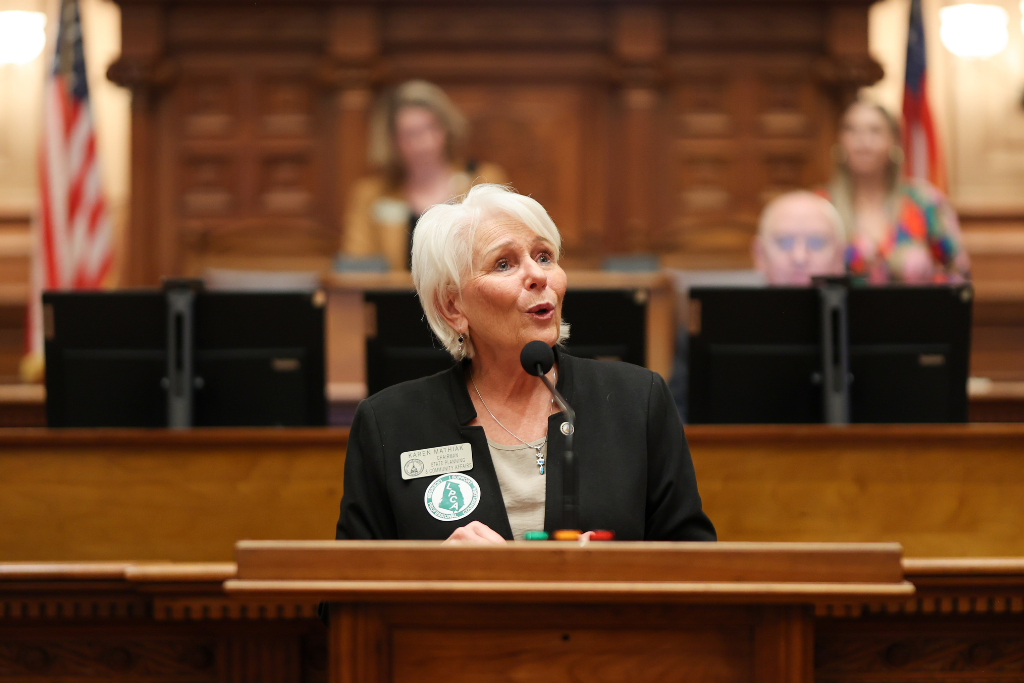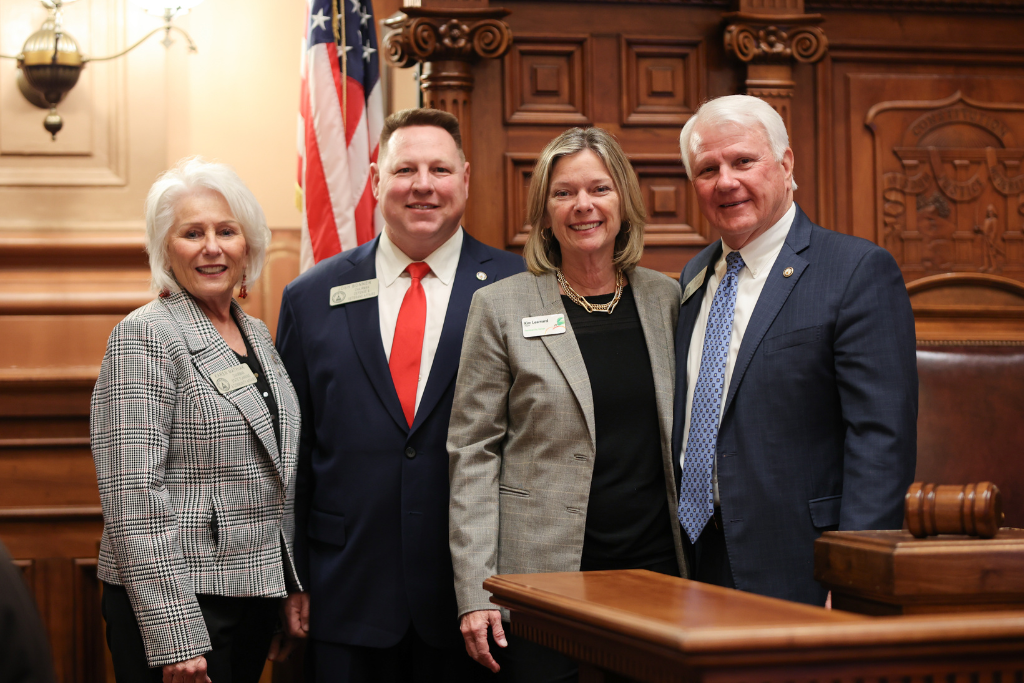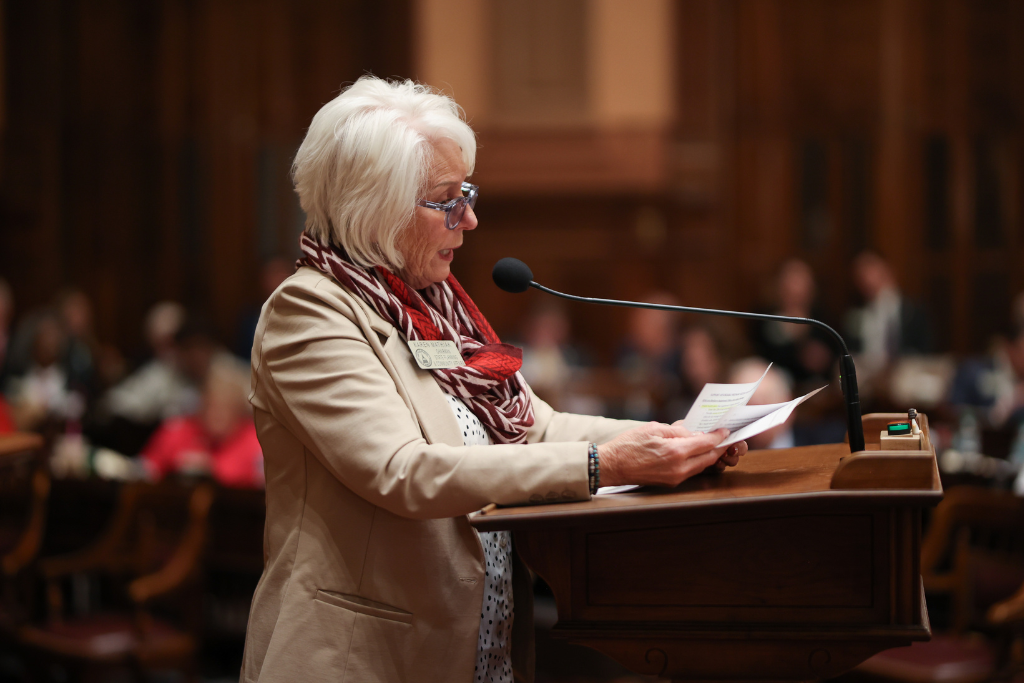Week 12 Legislative Session Recap 2025
March 31 - April 4, 2025

The Georgia General Assembly reconvened under the Gold Dome on Monday, March 31, 2025, for the 12th and final week of the 2025 legislative session. Throughout the week, we worked late into the evenings, voting on key measures to secure their final passage by the time the final gavel fell on Sine Die. By the end of the week, the House passed a number of bills and resolutions, several of which will now be sent to Governor Brian Kemp’s desk for him to sign into law or veto. In the coming paragraphs, I will highlight several bills that we voted on in our final days, as well as some significant legislation that received final passage in the Georgia General Assembly.
Ensuring the safety and well-being of Georgia’s students, teachers and school communities is a top priority of the Georgia House, and during the final week of the legislative session, my colleagues and I gave final passage to House Bill 268, a critical piece of legislation aimed at achieving that goal. First, the bill would enact Ricky and Alyssa’s Law, originally outlined in Senate Bill 17, which also received passage in the House during the final week with bipartisan support. SB 17 would require local school systems to implement a mobile panic alert system capable of connecting emergency services technologies. This would allow for real-time coordination between state and local first responder agencies during school security incidents. Additionally, HB 268 would require that schools procure mapping data by July 1, 2026, to be shared with state and local agencies. This would ensure that, in the event of a credible threat to a school system, all relevant agencies are included in the communication, thereby enhancing their coordinated emergency response efforts. The bill would also mandate the timely transfer of student records when a child in state custody is enrolled in a new school, requiring that all relevant educational and behavioral history be shared within five school days. This could include information like whether a student has been adjudicated for a felony or is currently serving a suspension. In addition to improving school safety, HB 268 would address mental health concerns and student discipline. It would require that all schools serving students in grades six through 12 provide one hour of suicide awareness and prevention training and one hour of youth violence prevention training each school year, beginning in the 2026-2027 school year. The bill would also mandate that school safety plans include provisions for addressing the behavioral health needs of both students and staff. By January 1, 2027, each safety plan would need to include a behavioral threat assessment management (BTAM) process to identify and mitigate potential threats. Furthermore, local school systems would be required to implement progressive discipline systems, which may include transitioning students to remote learning when there is a credible threat of violence. HB 268 is now headed to the governor’s desk for final approval and, if signed into law, would provide important tools and protections for our schools and communities.
One of the most pivotal actions that the House took during the last week of the 2025 legislative session was the final passage of House Bill 68, the Fiscal Year (FY) 2026 budget with the adoption of a conference committee report. The conference committee report for HB 68, which reflects the culmination of final agreements between the House and Senate, highlights Georgia’s commitment to addressing essential areas that impact all Georgians, such as public safety, education, healthcare, the judicial system and numerous other areas of state funding, ensuring that the state’s resources are allocated to meet the evolving needs of its citizens. With a focus on sustaining these investments, the FY 2026 budget represents a significant step toward promoting the state’s growth and long-term prosperity. The final version of HB 68 allocates funding for the upcoming fiscal year, which spans from July 1, 2025, to June 30, 2026. The FY 2026 budget, set to take effect on July 1st, is based on a revenue estimate of $37.8 billion, marking an increase of $1.6 billion—or 4.4 percent—over the original FY 2025 budget. HB 68 now awaits the governor’s signature, enacting it into law. For more information on the highlights of the FY 2026 budget, please visit here.
My House colleagues and I also gave final passage to Senate Bill 5, which would outline requirements for insurers regarding prior authorization programs, mandating that they lower prior authorization requirements for high-performing providers. SB 5 also includes provisions from a previously passed House bill, House Bill 124, which would require all health benefit policies administered by the State Health Benefit Plan (SHBP) in Georgia to provide health insurance coverage for services related to Pediatric Autoimmune Neuropsychiatric Disorders Associated with Streptococcal Infections (PANDAS) and Pediatric Acute Onset Neuropsychiatric Syndrome (PANS). All SHBP policies renewed or issued on or after July 1, 2025, would be required to align with nationally recognized clinical practice guidelines and apply to diagnosis, treatment, management and monitoring of these conditions. Both PANS and PANDAS are rare diseases that have previously not been recognized under the SHBP as covered conditions, and this legislation would help ensure that affected families and patients can receive the care they need. Both provisions of the bill seek to improve health insurance for Georgians, ensuring that patients experience less hurdles when seeking medications and coverage.
Earlier in the week, the House gave final passage to Senate Bill 170, which would create a grant program to acquire and install backup generators for certain rural hospitals. The program would apply to acute care hospitals located in rural counties with fewer than 100 beds and situated in any region where the governor declared a state of emergency after July 1, 2024. In March, the House passed House Bill 262 with the goal of establishing the same grant program. SB 170 would empower the Department of Community Health, in partnership with the Georgia Emergency Management and Homeland Security Agency, to develop grant criteria and oversee the distribution of funds. These grants would be awarded on a case-by-case basis, ensuring each hospital receives the tailored support needed to address its specific challenges. Priority would be given to rural hospitals that are currently lacking backup generators and the resources to install them. Following the destruction caused by Hurricane Helene and other recent storms, this legislation would be a step toward strengthening rural healthcare infrastructure. By equipping these facilities with reliable backup power, this legislation would ensure that they can continue delivering critical medical services without disruption during emergencies.
Furthermore, the House gave passage to Senate Bill 131, which mirrors a previously passed measure – House Bill 612. This legislation would add the insurance commissioner to the Behavioral Health Coordinating Council and establish a parity compliance review panel within the council. Parity refers to protections designed to ensure certain types of health plans cover mental health and substance use disorders in the same way that coverage is provided for other types of health conditions. The council and panel would be responsible for overseeing compliance with mental health parity laws by healthcare providers and insurers. SB 131 would also require healthcare providers to report parity concerns, and the panel would assess the concerns and make recommendations if violations are found. The panel would further develop educational materials to highlight mental health parity rights and compliance. Additionally, the panel would work with government agencies to establish procedures for enforcing parity laws, though it would not have the authority to impose financial penalties on healthcare providers for failing to report. There have been concerns regarding the current reporting system in the state, and this legislation seeks to increase oversight and streamline the process so that insurers and providers comply with parity laws and ensure that Georgians receive equal care for mental health concerns.
On Sine Die, we gave final passage to several bills, including Senate Bill 101, which would require that certain health benefits policies renewed on or after January 1, 2026, include coverage for medically necessary orthotic and prosthetic devices. Coverage would apply when these devices are needed for activities of daily living, essential job-related tasks, personal hygiene and physical activities. SB 101 would limit coverage to no more than three devices per affected limb per covered individual within any three-year period. Under the bill, health coverage that is categorized as habilitative or rehabilitative would be comparable to coverage provided for other medical and surgical benefits. This coverage could be subject to the same cost-sharing requirements, including limitations for out-of-network providers. Additionally, the bill would require that the insurance commissioner submit a report by July 1, 2032, to the House Insurance Committee and the Senate Insurance and Labor Committee, outlining the implementation of this coverage requirement to help guarantee that insurers are complying with coverage of these devices. Orthotic and prosthetic devices are essential devices that allow individuals to perform daily tasks, remain active in the workforce and maintain their independence. This legislation would help ensure that those who rely on these devices can access them without facing an overwhelming financial burden.
In this final week of the legislative session, the House gave final passage to a number of bills, including House Bill 123, which would change how intellectual disability (ID) is determined in death penalty cases. Under HB 123, if the court finds the defendant does have an ID, the jury could choose to sentence that individual to life in prison instead of the death penalty. House Bill 307 also received final passage and would amend the Georgia Early Literacy Act to include dyslexia, renaming it the Georgia Early Literacy and Dyslexia Act. The bill aims to improve reading instruction for students at risk of falling behind or showing signs of dyslexia by aligning teaching methods with the science of reading principles. HB 307 would also prohibit the use of the three-cueing method as the primary literacy instruction approach and establish the Georgia Literacy Plan Coordination Council to oversee and ensure standardized training across the state. Similarly, Senate Bill 93, which would require that the content standards align with the science of reading for core curricula for state-approved educator preparation programs, received final passage. House Bill 216, named in memory of former State Representative and House Rules Chairman Richard Smith, was also among the bills that received final passage. This legislation would establish the Richard H. Smith Georgia CHIPS Advancement in Research and Development Act and would create funds to provide grants and loans to attract semiconductor companies to Georgia, as well as support workforce education and training in high-demand semiconductor and microelectronics careers. House Bill 266, which would support Georgia’s military veterans, also received final passage and is now awaiting the governor’s decision. The bill would increase the income exclusion for military retirement benefits to $65,000 for retired military members under the age of 65. Additionally, House Bill 136 received final passage, which would allow parents of children age five and under to claim a $250 state income tax credit, which would expand the state income tax credit for child care expenses.
Following the end of the 2025 legislative session, Governor Kemp now has 40 days to either sign or veto any legislation that received final passage by the General Assembly. Depending on the bill, some will become law upon the governor’s signature, while others may take effect on a specified enactment date. Any bills not signed or vetoed within the 40-day period after Sine Die will automatically take effect in Georgia. Any House and Senate bills that did not receive final passage this session may still be eligible for consideration during next year’s legislative session. To stay informed about the bills the governor signs into law, please click here.
As we head into the interim, the time between legislative sessions, my colleagues and I will begin the study committee process later this year. These committees will take a deep dive into specific issues currently impacting Georgia, with the goal of gathering valuable insights that will help shape the legislation we introduce during next year’s session. The following study committees were approved this session: the House Study Committee on Reinsurance for Essential Industries, created by House Resolution 40; the House Study Committee on Cancer Access, created by House Resolution 72; the House Study Committee on the Costs and Effects of Smoking, created by House Resolution 304; the House Study Committee on Funding for Next Generation 9-1-1, created by House Resolution 429; the House Study Committee on Georgia’s Investment Funds, created by House Resolution 557; the House Study Committee on the State Board of Registration of Used Motor Dealers and Used Motor Vehicle Parts Dealers, created by House Resolution 558; the House Study Committee on Abandoned Child Placement Following Hospital Discharge, created by House Resolution 611; the House Study Committee on Student Attendance in Pre-K-12 Education, created by House Resolution 711; the House Study Committee on Improving Access to Internal Medicine in Rural Areas, created by House Resolution 753; the House Study Committee on Evaluating Funding for Public Health, created by House Resolution 847; the House Study Committee on Election Procedures, created by House Resolution 885 and the House Study Committee on Reducing and Prioritizing Mandates for Public School Administration, created by House Resolution 887.
Although this legislative session has ended, I encourage you to share your thoughts on how I can best support our district and what matters most to you and your family, as your input is invaluable. I encourage you to reach out by calling 404-656-0213 or emailing
karen.mathiak@house.ga.gov. As always, thank you for allowing me to serve as your representative.










